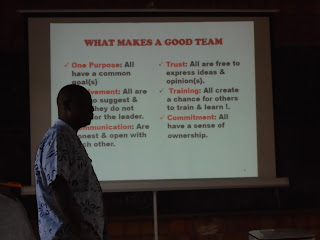LEADERSHIP AND LEADERSHIP SKILLS
“Good
leadership is fundamentally about one’s qualities and attitudes. In other
words, it is not so much about your position as a manager, administrator or
subordinate within the institution.
Good
leadership is having a clear vision. A leader is always going somewhere, never
satisfied with simply maintaining the status Quo. Their task is to engage the
future of their department or institution creatively. It is commonly said that
people fall into two main categories: those who mould the future and those who
are moulded by it. As a leader you have to belong to the first category.
Leaders also have to have a vision for those they lead, inspiring and
challenging them, in order to get the best out of them.
Good
leadership involves possessing the willingness to delegate. As a leader, you
are a team leader. You need to change your focus from doing a job well, to
equipping others to do it-perhaps even better than yourself!
All leaders
handle power, and none are exempt from the temptation to use it to satisfy
their personal needs or lust. But, good leadership will always involve the use
of power to serve rather than to dominate.
Good
leadership will also include possessing the vital qualities of trustworthiness
and accountability.
 |
| Vincent preaching the workshop |
An effective
leader is more than a skilled manager. Management is essentially the
stewardship of the institution’s resources. It is concerned with making a group
of people or an institution work effectively and efficiently. Leadership is
more than management; an effective team leader must be able to lead and to
manage. There are certain skills that play a key role in developing the
potential of both a leader and their team.
Important
skills include, communicating a vision to people in an effective way and
motivating them to work together. A leader also needs to know how to go about
choosing a team which will be appropriate for a particular project or area of
work. As a leader, building commitment within your team will certainly mean
that each of its members will enjoy their work. Because, they were a part of
that decision.
Setting goals and
objectives is essential for the progress of an institution or department. But,
you have also to know how to work towards them systematically and consistently.
Our big goals as an institution of department will never be achieved without
understanding and applying the practice of delegation!
Making
decisions is part of the job of any team leader, and unfortunately, it is a
skill which can be learned. It brings great benefit to the good health and life
of any team.
Good
leadership involves putting people before targets, so that nobody ends up
feeling “used”. It involves helping your team members achieve their full
potential by practical training in order to succeed in their work. This
therefore, requires you as a leader to work with the team towards achieving a
set and or to always avail yourself to your team members for consultation.
Teamwork
will never be without occasional instances of disagreement. Therefore, understanding
and resolving conflict will help you minimise any destructive effects conflicts
can bring within a department or institution. And, in the end, the process of
reconciliation can be embarked on for the benefit of the institution’s growth
and development.”
SOURCE:
Brief workshop notes by Vincent, B. Sebukyu.




